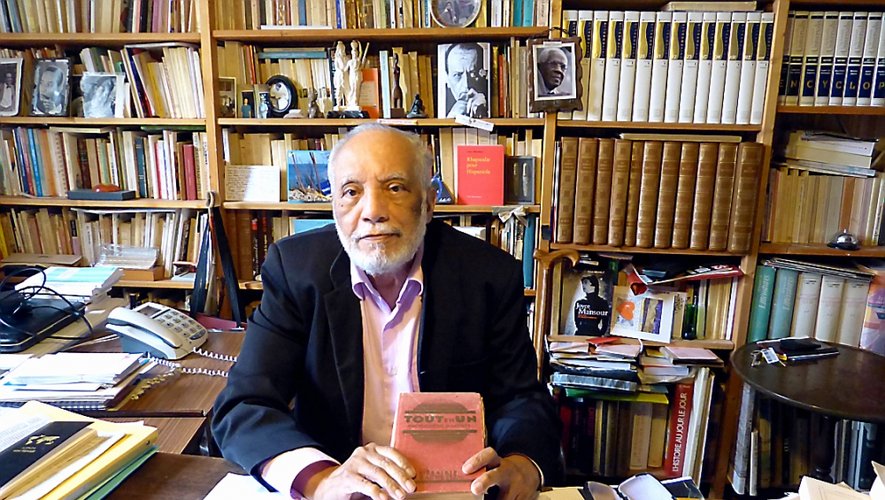|
Getting your Trinity Audio player ready...
|

A first Creole Bonne Page: Michel-Rolph Trouillot’s Ti difé boulé sou istoua Ayiti
Jean Jonassaint
Ti difé boulé sou istoua Ayiti (1977) is perhaps the least-known and certainly least-quoted work of Michel-Rolph Trouillot (1949-2012), a Haitian intellectual who needs no introduction, but it is undoubtedly his most significant book regarding Haitian literary history. We therefore feel it is important to make the work known to a readership other than Haitian by posting the first chapter in its 1977 original Creole edition as well as in French, Spanish and English translations. We would like to thank Évelyne and Lyonel Trouillot for authorizing the publication and translation of this excerpt. We would also like to thank Mariana Past and Benjamin Hebblethwaite for allowing us to use their English translation of this chapter.
From both a generic and a linguistic point of view, Ti difé boulé sou istoua Ayiti (1977) belongs to a series of texts dating back to Cric? Crac! by Georges Sylvain (1901). A series which includes among others Abréjé Istwa Daiti: 1492-1945 by F. Lwi Déroch (1945), Antigone en créole (1953) by Félix Morisseau-Leroy, and closer to our times, and especially closer to his poethics, notably La Parole des grands fonds (1973) and Quel mort tua l’empereur (1975) by the Kouidor troupe, Dézafi (1975) by Frankétienne, and Konbèlann (1976) by Georges Castera, many of whose texts had been circulating among the Haitian left since 1970-1971.
Aware of the importance of style for an effective communication, although exploring a sphere other than poetry or fiction, Trouillot, delving into the sources of national history, like his predecessors, draws on the country’s popular narrative traditions the appropriate forms (lodyans, tales, songs, proverbs, riddles, mythical characters), but also the words necessary for a scholarly historical analysis, in particular of the class struggles which led to the revolution of 1804, which is accessible to all Haitians. In this respect, this Trouillot’s work is completely new, as it paves the way for a discursive prose that is distinctly Haitian, in other words, rooted in traditional popular forms while at the same time expressing a modern taught.
Thus, coming full circle, Trouillot, more than others before or after him, fulfills Georges Sylvain’s wish in his “Notice” to Cric? Crac! calling on our intellectuals to take advantage of the extraordinary qualities of the Haitian Creole in these terms which it is worth to quote:
“The artistic aptitudes of the Creole dialect have already been demonstrated, if not by us, at least by a few of our congeners on neighboring islands. That we can renew it to our advantage is not in doubt. With its collection of terms, tricks and onomatopoeias, borrowed not only from the old French of the Île de France, but also from the dialects of Normandy and Picardy, from Bas-Breton, Provençal, Spanish, English, the idioms of Central Africa and the language of the ancient aborigines, Haitian Creole seems freer, more flexible and more varied than that of other French colonial countries. The mischievous bonhomie of our folktales and songs, their so exact and so keen observation, the fine and healthy philosophy of our proverbs, would have deserved to be expressed elsewhere than in traditional oral creations necessarily incomplete and doomed to early alteration” (p. 7).
For a better understanding of Trouillot’s work and its context of production, to see, to read or to listen to, among other choices:
Michel Rolph Trouillot sou «Ti Difé Boulé sou Istwa Ayiti». Entèvyou Richard Brisson.
Kouidor : Synopsis des pièces et spectacles de Kouidor
Kouidor : Synopses of Kouidor plays and spectacles
Kouidor : Sinopsis Piès teyat ak Espektak Kouidor
Carolle Charles, “New York 1967–71, Prelude to ‘Ti Difé Boulé’: An Encounter with Liberation Theology, Marxism, and the Black National Liberation Movement,” Journal of Haitian Studies19.2 (2013): 152-159.
Jean Jonassaint, “Haitian Literature in the United States, 1948-1986,” in American Babel: Literatures of the United States from Abnaki to Zuni (ed. by Marc Shell). Cambridge: Harvard University Press, 2002, 431-449.
Jean Jonassaint, “For the Trouillots: An Afterword to the English translation of Ti difé boulé sou istoua Ayiti,” in Michel-Rolph Trouillot, Stirring the Pot of Haitian History, University of Liverpool Press (2021), 175-189.
Mariana Past and Benjamin Hebblethwaite, “Translators’ Note,” in Michel-Rolph Trouillot, Stirring the Pot of Haitian History, University of Liverpool Press (2021), XXV-XXXIV.
Bonne lecture!
If you have any comments or suggestions, do not hesitate to write to us. In advance, thank you very much.






